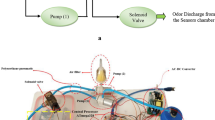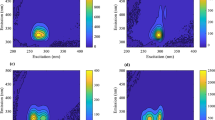Abstract
There is usually some fake sesame oil in Chinese market that mixes sesame oil flavor into other kinds of edible oils to cheat customers, but it is hard to discriminate. A new analytical method based on directly mid-infrared spectroscopy combined with chemometrics was studied for identifying adulterated sesame oil in this study. We analyzed the spectral characteristics of sesame oil, three kinds of edible oils, and sesame oil flavor and found that there are obvious spectral differences between them. Through principal component analysis (PCA) method, the pure sesame oil and other edible oils that mixed with sesame oil flavor can be obviously classified. To further demonstrate the ability of infrared spectroscopy to discriminate fake sesame oil, we established independent modeling of class analogy (SIMCA) and partial least square discriminate analysis (PLS-DA) model and found there are effective for discrimination. We also studied the spectral changes with different adulteration rates of sesame oil flavor and found that the absorption peak at 1055–1025 cm−1 was weakened and shifted with the increase in the concentration of sesame oil flavor.





Similar content being viewed by others
References
Belo RFC, Nunes CM, dos Santos EV, Augusti DV, Pissinatti R (2012) Single laboratory validation of a SPE method for the determination of PAHs in edible oils by GC-MS. Anal Methods UK 4:4068–4076. doi:10.1039/C2ay25818h
Casale M et al (2012) Characterisation of PDO olive oil Chianti Classico by non-selective (UV-visible, NIR and MIR spectroscopy) and selective (fatty acid composition) analytical techniques. Anal Chim Acta 712:56–63. doi:10.1016/j.aca.2011.11.015
Cercaci L, Rodriguez-Estrada MT, Lercker G (2003) Solid-phase extraction-thin-layer chromatography-gas chromatography method for the detection of hazelnut oil in olive oils by determination of esterified sterols. J Chromatogr A 985:211–220. doi:10.1016/S0021-9673(02)01397-3
de la Mata P, Dominguez-Vidal A, Bosque-Sendra JM, Ruiz-Medina A, Cuadros-Rodriguez L, Ayora-Canada MJ (2012) Olive oil assessment in edible oil blends by means of ATR-FTIR and chemometrics. Food Control 23:449–455. doi:10.1016/j.foodcont.2011.08.013
de la Mata-Espinosa P, Bosque-Sendra JM, Cuadros-Rodriguez L (2011) Quantification of triacylglycerols in olive oils using HPLC-CAD. Food Anal Methods 4:574–581. doi:10.1007/s12161-011-9207-3
Deng DH, Xu L, Ye ZH, Cui HF, Cai CB, Yu XP (2012) FTIR spectroscopy and chemometric class modeling techniques for authentication of Chinese sesame oil. J Am Oil Chem Soc 89:1003–1009. doi:10.1007/s11746-011-2004-8
Dong XB, Li QH, Sun DJ, Chen XM, Yu XZ (2014) Direct FTIR analysis of free fatty acids in edible oils using disposable polyethylene films. Food Anal Methods 1–7. doi:10.1007/s12161-014-9963-y
Dupuy N, Galtier O, Ollivier D, Vanloot P, Artaud J (2010) Comparison between NIR, MIR, concatenated NIR and MIR analysis and hierarchical PLS model. Application to virgin olive oil analysis. Anal Chim Acta 666:23–31. doi:10.1016/j.aca.2010.03.034
Guzman E, Baeten V, Pierna JAF, Garcia-Mesa JA (2011) Application of low-resolution Raman spectroscopy for the analysis of oxidized olive oil. Food Control 22:2036–2040. doi:10.1016/j.foodcont.2011.05.025
Hai Z, Wang J (2006) Detection of adulteration in camellia seed oil and sesame oil using an electronic nose. Eur J Lipid Sci Technol 108:116–124. doi:10.1002/ejlt.200501224
Inarejos-Garcia AM, Gomez-Alonso S, Fregapane G, Salvador MD (2013) Evaluation of minor components, sensory characteristics and quality of virgin olive oil by near infrared (NIR) spectroscopy. Food Res Int 50:250–258. doi:10.1016/j.foodres.2012.10.029
Konsoula Z, Liakopoulou-Kyriakides M (2010) Effect of endogenous antioxidants of sesame seeds and sesame oil to the thermal stability of edible vegetable oils. LWT-Food Sci Technol 43:1379–1386. doi:10.1016/j.lwt.2010.04.016
Lerma-Garcia MJ, Ramis-Ramos G, Herrero-Martinez JM, Simo-Alfonso EF (2010) Authentication of extra virgin olive oils by Fourier-transform infrared spectroscopy. Food Chem 118:78–83. doi:10.1016/j.foodchem.2009.04.092
Mansor TST, Man YBC, Rohman A (2011) Application of fast gas chromatography and fourier transform infrared spectroscopy for analysis of lard adulteration in virgin coconut oil. Food Anal Methods 4:365–372. doi:10.1007/s12161-010-9176-y
Marcone MF, Wang SA, Albabish W, Nie SP, Somnarain D, Hill A (2013) Diverse food-based applications of nuclear magnetic resonance (NMR) technology. Food Res Int 51:729–747. doi:10.1016/j.foodres.2012.12.046
Mirghani MES, Man YBC, Jinap S, Baharin BS, Bakar J (2003) Application of FTIR spectroscopy in determining sesamol in sesame seed oil. J Am Oil Chem Soc 80:1–4. doi:10.1007/s11746-003-0640-1
Park MH et al (2011) Application of solid phase-microextraction (SPME) and electronic nose techniques to differentiate volatiles of sesame oils prepared with diverse roasting conditions. J Food Sci 76:C80–C88. doi:10.1111/j.1750-3841.2010.01954.x
Pinto RC, Locquet N, Eveleigh L, Rutledge DN (2010) Preliminary studies on the mid-infrared analysis of edible oils by direct heating on an ATR diamond crystal. Food Chem 120:1170–1177. doi:10.1016/j.foodchem.2009.11.053
Rachocki A, Tritt-Goc J (2014) Novel application of NMR relaxometry in studies of diffusion in virgin rape oil. Food Chem 152:94–99. doi:10.1016/j.foodchem.2013.11.112
Rodriguez-Saona LE, Allendorf ME (2011) Use of FTIR for rapid authentication and detection of adulteration of food. Annu Rev Food Sci Technol 2:467–483. doi:10.1146/annurev-food-022510-133750
Rohman A, Man YBC (2010) Fourier transform infrared (FTIR) spectroscopy for analysis of extra virgin olive oil adulterated with palm oil. Food Res Int 43:886–892. doi:10.1016/j.foodres.2009.12.006
Rohman A, Man YBC (2012) Authentication of extra virgin olive oil from sesame oil using FTIR spectroscopy and gas chromatography. Int J Food Prop 15:1309–1318. doi:10.1080/10942912.2010.521607
Seo HY et al (2010) Detection of corn oil in adulterated sesame oil by chromatography and carbon isotope analysis. J Am Oil Chem Soc 87:621–626. doi:10.1007/s11746-010-1545-6
Sherazi STH, Talpur MY, Mahesar SA, Kandhro AA, Arain S (2009) Main fatty acid classes in vegetable oils by SB-ATR-Fourier transform infrared (FTIR) spectroscopy. Talanta 80:600–606. doi:10.1016/j.talanta.2009.07.030
Vlachos N, Skopelitis Y, Psaroudaki M, Konstantinidou V, Chatzilazarou A, Tegou E (2006) Applications of Fourier transform-infrared spectroscopy to edible oils. Anal Chim Acta 573:459–465. doi:10.1016/j.aca.2006.05.034
Vlahov G, Giuliani AA, Del Re P (2010) C-13 NMR spectroscopy for determining the acylglycerol positional composition of lampante olive oils. Chemical shift assignments and their dependence on sample concentration. Anal Methods UK 2:916–923. doi:10.1039/C0ay00028k
Yang H, Irudayaraj J, Paradkar MM (2005) Discriminant analysis of edible oils and fats by FTIR, FT-NIR and FT-Raman spectroscopy. Food Chem 93:25–32. doi:10.1016/j.foodchem.2004.08.039
Zhang Q, Liu C, Sun ZJ, Hu XS, Shen Q, Wu JH (2012) Authentication of edible vegetable oils adulterated with used frying oil by Fourier transform infrared spectroscopy. Food Chem 132:1607–1613. doi:10.1016/j.foodchem.2011.11.129
Acknowledgments
This work was supported by the National Science & Technology Pillar Program (2013BAD19B02) and Natural Science Foundation of China (31271614). Xiande Zhao, Daming Dong, Wengang Zheng, Leizi Jiao and Yun Lang have received research grants from National Natural Science Foundation of China and Beijing Research Center of Intelligent Equipment for Agriculture.
Conflict of Interest
Xiande Zhao declares that he has no conflict of interest. Daming Dong declares that he has no conflict of interest. Wengang Zheng declares that he has no conflict of interest. Leizi Jiao declares that he has no conflict of interest. Yun Lang declares that she has no conflict of interest. This article does not contain any studies with human or animal subjects.
Author information
Authors and Affiliations
Corresponding author
Rights and permissions
About this article
Cite this article
Zhao, X., Dong, D., Zheng, W. et al. Discrimination of Adulterated Sesame Oil Using Mid-infrared Spectroscopy and Chemometrics. Food Anal. Methods 8, 2308–2314 (2015). https://doi.org/10.1007/s12161-015-0125-7
Received:
Accepted:
Published:
Issue Date:
DOI: https://doi.org/10.1007/s12161-015-0125-7




